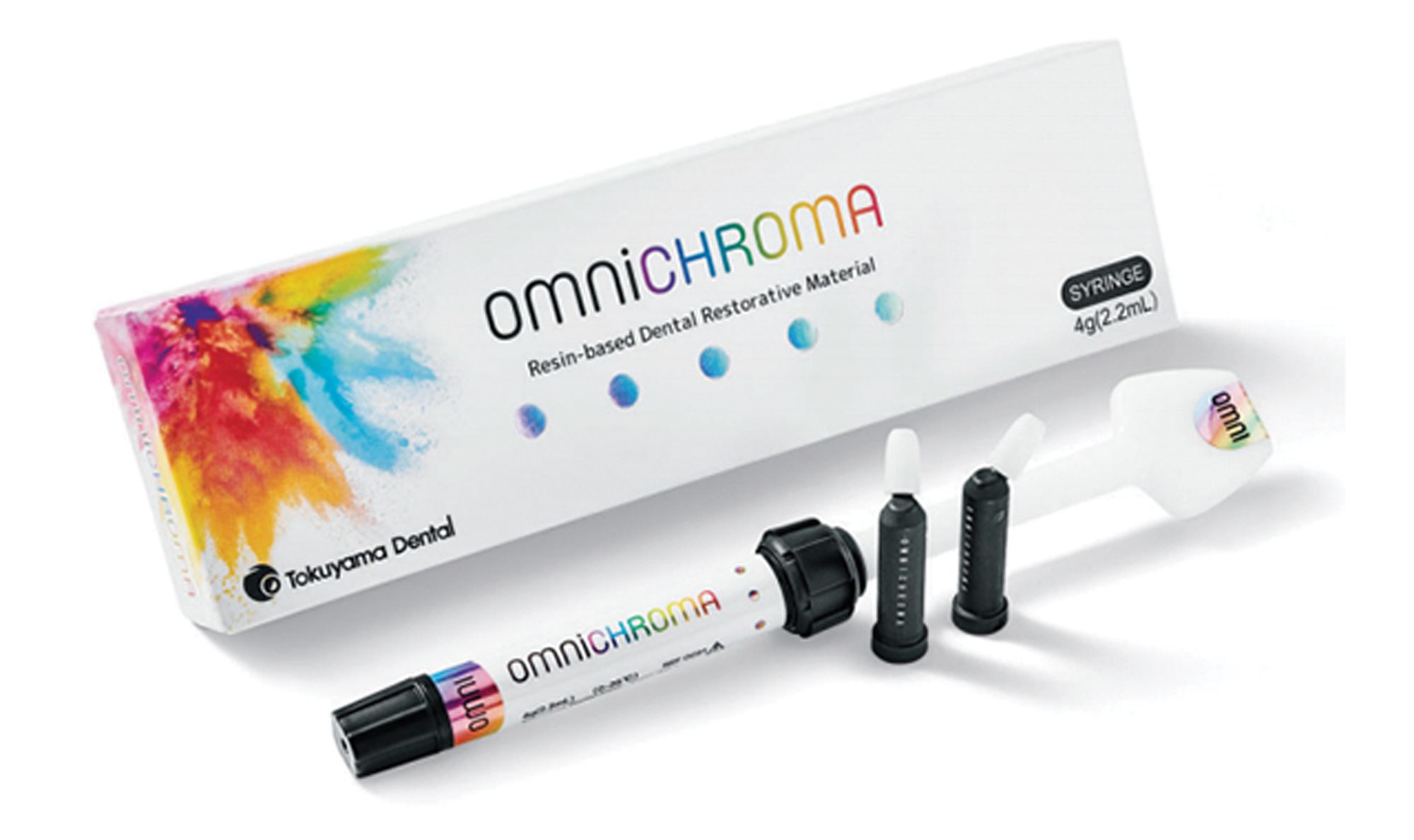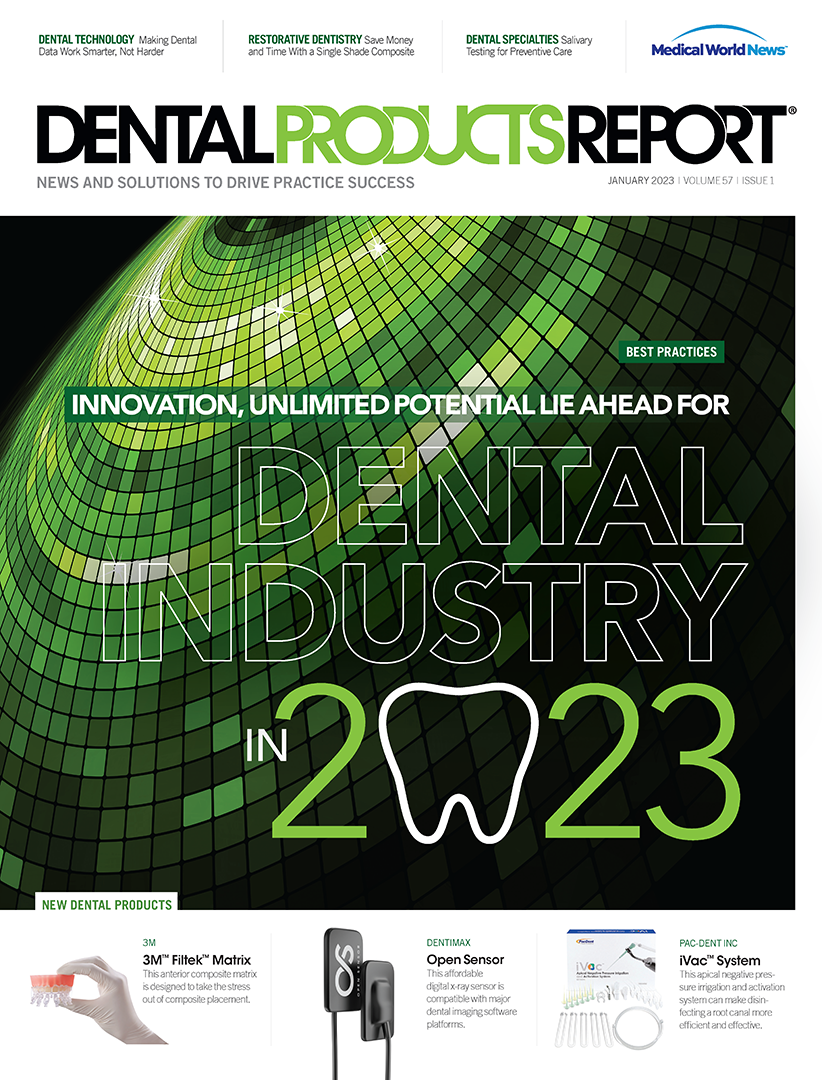Putting an exact cost on how much money a dental practice can save by using a single composite shade may seem difficult to calculate, but Kevin Brown, DDS, of Minimally Invasive Dental Aesthetics in Bellevue, Washington, has a pretty good idea: $6000.
“I had quite a number of composites going on,” he explains. “At one point when we went through the refrigerator, we looked at all the expired composites that we had, and it totaled up to $6000. We were just like, ‘Oh, that’s not good.’ If somebody’s not being very diligent at keeping track of what’s in the fridge and reordering new ones as they’re getting used up, the shades that we don’t use very often end up expiring.”
All-in-One
OMNICHROMA from Tokuyama Dental America solves an inventory and cost balance problem by offering 1 composite that can match all 16 shades in the VITA® Classical Shade Guide.
“I have used OMNICHROMA since it came on the market in 2019,” says Juan Uribe, DDS, of Uribe Family & Cosmetic Dentistry in Sioux Center, Iowa. “It all started from curiosity [about] an advertisement for a single-shade composite that claims to match all 16 VITA Classical tooth shades, from A1 to D4. It seemed too good to be true and I had to confirm it myself. From day 1, I was so impressed and satisfied with this new Smart Chromatic Technology by Tokuyama that now I use OMNICHROMA and OMNICHROMA BLOCKER in more than 90% of all my composite cases: anterior, posterior, simple or complex, Class V, core build-up, to cover screw access hole in implant restoration, endo access in crowns, diastemas closures, [and to] repair temporary restorations. Wherever I need composite, I use OMNICHROMA.”
OMNICHROMA
This universal composite is designed for every shade and every class. OMNICHROMA is the world’s first universal composite that esthetically matches every patient’s shade, from A1 to D4, with a single shade. Its uniformly sized supra-nano spherical fillers (260 nm spherical SiO2-ZrO2) are the exact size and shape needed to generate red-to-yellow color as ambient light passes through the composite. There is no need to add pigments or dyes. The red-to-yellow color generated by the spherical fillers combines with the reflected color of the patient’s surrounding dentition, creating the perfect match using Smart Chromatic Technology. Its wide color-matching ability eliminates the shade-taking procedure, reducing composite inventory and saving clinicians time and money.
Tokuyama Dental America
877-378-3548 | OMNICHROMA.com
Dr Brown adds, “I got early access to it. I had been using Tokuyama’s other products and writing for them. As I was getting this stuff, I was skeptical thinking that, ‘Oh, how can a single-shade composite work in so many scenarios?’ As I started using it, I was very impressed and surprised at how good it works in so many situations.”
Avoiding the Trap of “Too Much”
“The cost savings can happen for both me and the patient because I do a lot of the layered composites,” Dr Brown says. “I have a very broad range of composites—at least I did before OMNICHROMA—where I’d have specific dentin shades from 1 brand; and 10 enamel shades from a different brand that I liked; and a translucent shade; and this, that, and the other.”
Thinking back to how much expired, unused composite the practice had gives him pause. “That was an experience when we figured out that we were using so much extra composite that was outdated,” Dr Brown says. “And now I use just 2 composite systems: I use OMNICHROMA and Estelite Omega (Tokuyama Dental America), and oftentimes I’ll even use the 2 in conjunction. I’ve learned how these 2 materials work together, and the science behind them is similar. The cost savings have been pretty eye-opening and significant, for sure. It’s at least $6000 per year in our office that it saved us in materials.”
Smart Savings
Another savings, Dr Uribe notes, is that OMNICHROMA is less expensive than other composites. “The average cost of major brand composites is about $50 per milliliter, while OMNICHROMA is below $50,” Dr Uribe says. “Tokuyama constantly runs promotions, saving you an additional 33% off the material cost. Fees for composite restorations are low and require time to maintain a large inventory of shades. Because of this, you must be wise in utilizing your time efficiently and maintain an inventory of shades that will not break the bank or expire before you use them all.
“Using the same material and the same steps over and over, you become a master in handling the material,” he continues. “As you become more efficient and predictable, you are reducing or eliminating remakes, which translates into a positive impact on your bottom line.”
Ordering
Time is money, and dentists also can realize cost savings through streamlining the composite ordering process.
“OMNICHROMA has made the ordering process easier and better,” Dr Uribe explains. “In the past, it was time-consuming and difficult, and even more difficult if you had more than 1 operatory. OMNICHROMA has made it possible for there to be no waste.”
The process is easier for both veteran and new staff.
“When you are in the process of training someone on how to order, it simplifies that whole process,” Dr Brown says. “You have less stock to keep track of. My assistants have really enjoyed that, and it’s definitely simplified things.” Clinicians also save time when using the product. Less chair time means happier patients and the ability to see more of them.
“There are a lot of great composites out there,” Dr Brown says. “I teach a lot of hands-on classes with composites. OMNICHROMA is a totally different thing, because it’s trying to simplify for the practitioners who want to do esthetic stuff but don’t necessarily do well with the layered technique.
“When it comes to ordering in our office and knowing that you have this broad range of composite brands that do very well in a lot of different scenarios, OMNICHROMA’s cost savings is probably one of the bigger driving forces I would see for a lot of people, because it just simplifies things,” he continues. “The cost of a syringe of OMNICHROMA is less, so when you consider that factor, in addition to knowing that you can use it on pretty much anything in the mouth, from a simple filling to a complex build-up to a Class V restoration along the gum line to a fractured front tooth, its ability to just be used in so many different applications is very attractive.”
Usage
Although money is an important consideration, if dentists don’t want to use the product, it’s useless.
“There is a little bit of a learning curve on certain restorations, but it’s easily learned as you get used to using the material,” Dr Brown says. “The handling of it is great. The polishability of it is great. I’ve been using it for 3 years, and I haven’t had any issues with patients coming back with problems or chipping or color differences or polishability problems.”
In addition, Dr Uribe adds, “this composite consistency handles very well. Its moderate stiffness makes it easy to manipulate, contour, polish, and shine. Besides the putty, there is a new OMNICHROMA flowable to complement your desired consistency. OMNICHROMA’s incorporation of Smart Chromatic Technology turns the dentist into a magician.
“Complex shading systems usually call for a complex, time-consuming restoration procedures and multiple layers of opacities and translucencies to obtain highly esthetic results,” he continues. “With OMNICHROMA, you can obtain highly esthetic results fast, easy, and predictably. It cannot be simpler as there’s only 1 shade. There’s no waste of time in shade taking, tracking and recording all colors used for 1 restoration, and keeping up with your inventory.”
For Dr Uribe, OMNICHROMA was a pleasant, unexpected benefit. “Before I cured my first OMNICHROMA composite, I was skeptical; my assistant was shocked,” Dr Uribe says. “‘How are you going to cure something that is obviously off-shade?’ But the results were incredible—a seamless blending with the adjacent natural dentition after the material was cured. It left no doubts that this was a game-changer. The initial color discrepancy [white opaque] of the uncured material and the tooth helps as a visual aid while placing the composite. You easily identify and eliminate the excess composite on unwanted areas before the material is cured.”
The benefits of using a single composite shade include simplicity, speed, and—maybe best of all—cost savings.

